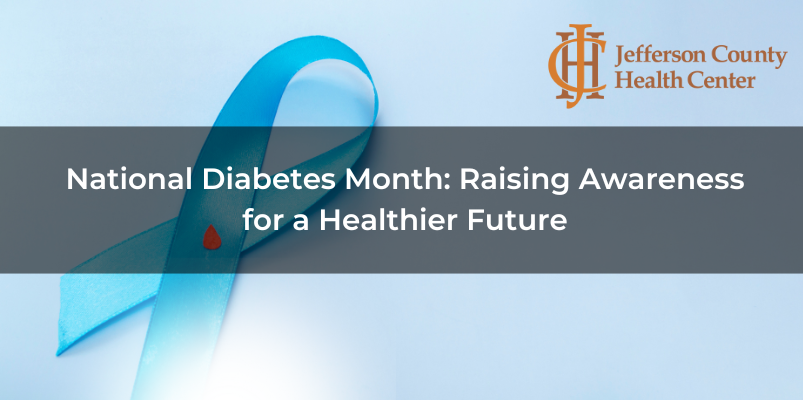National Diabetes Month: Raising Awareness for a Healthier Future
November 20, 2024

November is National Diabetes Month, a time dedicated to raising awareness about diabetes, its impact on millions of lives, and the importance of prevention, early detection, and management. Diabetes is a chronic health condition that affects how the body processes blood sugar (glucose). Left unmanaged, it can lead to serious complications such as heart disease, kidney damage, vision loss, and nerve damage.
Understanding Diabetes
There are three main types of diabetes:
- Type 1 Diabetes: An autoimmune condition where the body does not produce insulin, usually diagnosed in children and young adults.
- Type 2 Diabetes: The most common form, where the body becomes resistant to insulin or doesn’t produce enough. Risk factors include obesity, sedentary lifestyle, and family history.
- Gestational Diabetes: Develops during pregnancy and can increase the risk of Type 2 diabetes later in life for both mother and child.
The Importance of Awareness
Diabetes affects over 37 million Americans, with 96 million more adults having prediabetes—a condition that often leads to Type 2 diabetes without intervention. Raising awareness helps individuals understand their risk, recognize symptoms, and seek medical advice.
Recognizing the Signs
Common symptoms of diabetes include:
- Frequent urination
- Excessive thirst
- Extreme hunger
- Unexplained weight loss
- Fatigue
- Blurred vision
- Slow-healing wounds
If you or a loved one experiences these symptoms, consult a healthcare provider promptly.
Prevention and Management
For Type 2 diabetes, lifestyle changes play a significant role in prevention and management:
- Healthy Eating: Focus on a balanced diet rich in fruits, vegetables, lean proteins, and whole grains while limiting processed foods and added sugars.
- Regular Exercise: Engage in at least 150 minutes of moderate physical activity each week.
- Weight Management: Maintain a healthy weight to reduce the risk of insulin resistance.
- Routine Checkups: Regular blood sugar monitoring and screenings are essential for those at risk.
For individuals living with diabetes, working with a healthcare team to develop a personalized care plan is crucial. This plan often includes medication, blood sugar monitoring, and strategies to manage stress and avoid complications.
Resources and Support
National Diabetes Month is also a time to recognize the importance of community and support networks. Whether through local organizations, online forums, or healthcare providers, resources are available to help individuals and families navigate life with diabetes.
Take Action Today
Understanding diabetes and its impact is the first step toward creating a healthier future. Spread the word about National Diabetes Month by sharing information, attending events, and encouraging loved ones to get screened. Together, we can reduce the prevalence of diabetes and improve quality of life for those affected. For more information or support, call Jefferson County Health Center Clinics at 641-472-4156 to schedule an appointment with one of our providers to discuss your health concerns. Together, we can work toward better health for all.
References
- Centers for Disease Control and Prevention. "National Diabetes Statistics Report, 2023."
- American Diabetes Association. "Diabetes Risk Factors and Prevention."
- National Institute of Diabetes and Digestive and Kidney Diseases. "Diabetes Overview."
- Mayo Clinic. "Diabetes Symptoms and Causes."